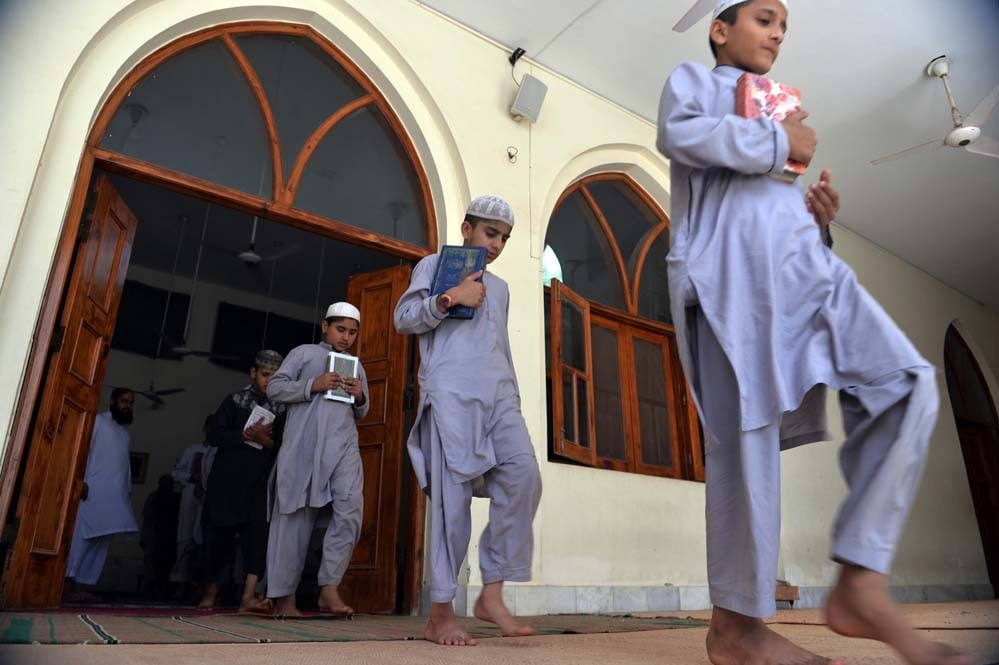
To counter Islamic extremism, curricula and syllabi must be reformed to instill critical thinking rather than indoctrination

Militant Islamists, the likes of Taliban, have a narrative. In Islam, it is mandatory for every Muslim, they maintain, to strive to establish an Islamic system of government at least in the Muslim majority states such as Pakistan. Muslim rulers, the narrative runs, are the stooges of the West and they are the real hurdles in the way of creating an Islamic order. The corrective course, militants suggest, is to occupy state through the use of violent means which, as they say, are inevitable, legitimate and the only way forward to discharge the sacred responsibility.
What these militants say is always justified, how distorted that interpretation may be, in the name of Islam. In our case, mentioning two sources are important.
First, part of this narrative comes from a particular understanding of Islam, which is taught in our madrassahs as renowned Islamic scholar Dr Javed Ahmed Ghamidi persuasively argues. Nevertheless, subscribers to the mentality are spread all across the country including schools, colleges and universities. Secondly, part of the explanation is the perception -- disseminated through governmental and nongovernmental channels including but not confined to text books -- that Pakistan came into being in the name of Islam because, the argument goes, in a Hindu-dominated India Muslims were maltreated and that the demand for Pakistan was inevitable as Muslims wanted to protect their religion and live according to it.
The natural outcome of such a narrative has been that many Pakistanis are convinced that establishing an Islamic system is the panacea to many problems we have been facing for too long.
In other words, perhaps, there would not have been any major problem with the official version of heroic and romanticised version of history telling with regard to Muslim separatism and its culmination into the creation of Pakistan if it were not for the reason of teaching that version as nearly an absolute fact, leaving no room for disagreement.
Nonetheless, the preceding two factors do not and cannot explain why Pakistan did not experience violent extremism of religious and sectarian denomination previously until since early 80s? Here we need a qualification. During early 80s, it was the politicisation of Islamist narratives, preached in madrassahs and taught in educational institutions, which spawned violent extremism of religious and sectarian variants. We need a counter narrative.
Force alone has not sufficed to end violent extremism. This is not only in our case but the world over too: from Afghanistan to Iraq to Yemen to Syria to US to UK and so on. As a result, policy makers around the globe, especially in countries such as the United States and United Kingdom, looked towards crafting counter narratives to tackle the challenge of Islamic extremism. Better late than never, policymakers, Ulema and academia in Pakistan have also realised that the idea of Islamic extremism needs a counter narrative as a corrective measure.
Looking at counter extremism efforts from other countries, especially the US and the UK, one does not find a single counter narrative document entailing how these states are poised to counter extremism. US and UK initiated endeavours at the government level and have also helped efforts at non-government level to discredit and delegitimise extremist narratives of various hues. These efforts fall under the domains of both counter and alternate narratives.
As I recounted in my preceding article, there have been encouraging efforts on both the government and non-governmental levels to construct counter narratives in Pakistan. Paigham-e-Pakistan, the counter narrative unanimous fatwa from Ulema of all persuasions, is a massive achievement, albeit the bouts of violent extremism show that something is still missing to help violence peter out.
The three-day international conference on "Radicalisation: Perceptions, Realities and Challenges of Campus Life" held in Air University Islamabad from 26-28 September 2018 shed light on how to end radicalisation in general and violent radicalisation in particular. In the joint session of Ulema and Vice Chancellors, two unanimous recommendations pertained to this query. First, it was agreed to disseminate Paigham-e-Pakistan in media and through other channels and incorporate it in curricula and syllabi of schools, colleges and universities. Secondly, the participants concurred that conferences, seminars and workshops that bring together all stakeholders on a common platform with regard to issues of national importance such as countering radicalisation should become a regular feature of universities and other related institutes. The understanding was that such gatherings would help in keeping stakeholders abreast with latest developments and issues that inform radicalisation or extremism of various forms and manifestations.
Like in the cases of US and UK, Pakistan does not only need to craft counter narratives but also alternate narratives. Counter narrative aims at deconstructing, discrediting and delegitimising the extremist narrative. Alternate narrative, on the other hand, does not challenge the extremist narrative directly. It focuses on what we are ‘for’ than what we are ‘against’. It lays emphasis upon solidarity, common causes, shared values, tolerance and openness, the very steps that undercut extremist narrative. It is important to know what Pakistan can learn from US and UK’s experiences.
Perhaps, it is the ‘say-do’ gap than anything else that undermines a state’s efforts to counter extremism. This remains true in the US case. In our case, this would mean recognising Islamist extremism as a problem on the one hand but pampering ‘good’ extremists on the other. Secondly, it is a question of credibility. When state is a facilitator behind the scenes in organising and facilitating conferences, seminar and research activities that help craft counter and alternate narratives, these efforts gain legitimacy in the public eye.
Similarly, our curricula and syllabi must instill critical thinking than indoctrination, most importantly in the courses of Islamic Studies, history and Pakistan Studies. This, in the very first place, requires a decisive break with a black-and-white simplification of the otherwise complex historical and contemporary situations and processes.